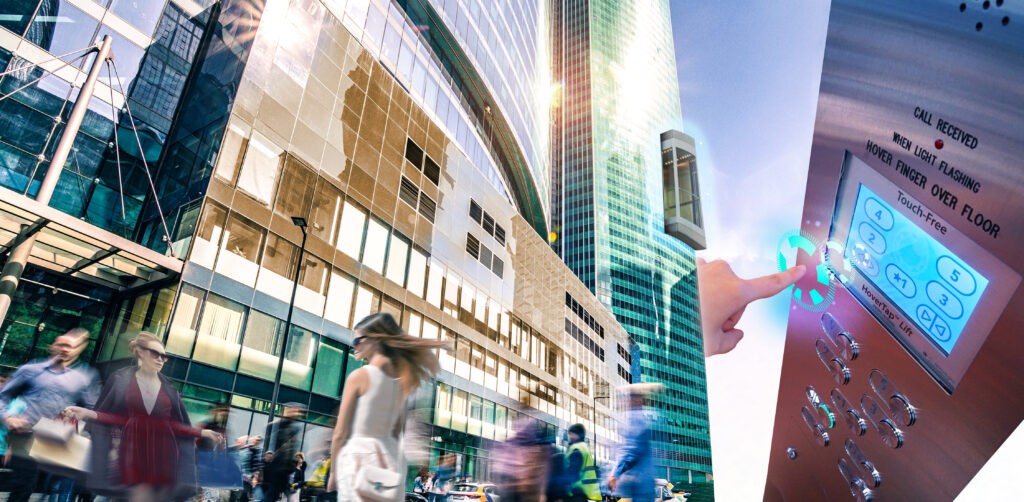Imagine a world where guests can call the elevator with a simple gesture and without needing to push unsanitary buttons.
Customer service is a vital part of the travel and hospitality industry, and hotels are upping their game to deliver on commitment and guarantee safe, clean, and germ-free environments. These high-volume pedestrian traffic environments are full of frequently touched surfaces that are susceptible to bacteria and germs. Innovation that helps prevent physical contact with frequently used touchpoints will emerge as the next technology must-have.
Artificial Intelligence and Touchless Technology
We are already seeing AI becoming more integrated into the hospitality industry to deliver in-person customer service. For example: Hilton Hotel’s robot, Connie[1], which is able to provide tourist information to guests. But AI does not need to be all flash to be effective. In fact, some of the simplest solutions are a more intuitive development that use built in artificial intelligence to improve human interaction.
Gesture recognition is a means of human-machine interaction using only body actions without the aid of voice. Actions such as hand swiping and finger motions are used as commands, replacing the need to press buttons or tap a keypad. The AI system reads these movements and gestures to provide the user with a natural interface with the machine.
Gesture recognition and touchless sensing market is projected to reach USD $37.6 billion by 2026 with North America having the largest market share for this technology. The global AI market as a whole is expected to reach USD $190.61 billion by 2025, according to MarketsandMarkets™ Strategic Insights.[2]
Elevator Experience
The elevator is one of the most hands-on, high-use activities within a hotel. But how often are these elevators actually cleaned? Unlike a hotel room or restaurant table, there is no lag time in between use and interrupting operations for regular cleaning intervals hinders the customer experience.
When the pandemic struck, NZ Technologies (NZTech) recognized the opportunity to re-engineer its flagship touchless product – the patented TIPSO AirPad®, originally developed for contactless control of equipment in the hospital surgical room where sterility is of utmost importance. The HoverTapTM system, an AI-powered touchless interface, was designed to enable gesture sensing for contactless control of traditional elevator buttons. As a complete solution, the HoverTapTM Lift integrates with the panel inside the cabin for floor selection, while the HoverTapTM Swipe operates as part of the hallway unit for calling the elevator. In effect, this eliminates physical contact with any surface altogether and maximizes facility cleanliness and convenience.
Customer Convenience
This solution was designed to have a shallow learning curve. It was necessary for it to be intuitive to use and respectful of privacy concerns. Guests do not have the time to watch explanatory videos or read instruction manuals while traveling from floor to floor, and they have very little tolerance for a new app to install, another QR code to scan, or in-cabin camera sensors that make it feel as though they are being watched.
The HoverTapTM Lift, instead, uses a unique sensor technology that enables real-time detection of the user’s finger position in three dimensions. Sensitive to the finger approaching in proximity to the interface and registering a floor selection with a gentle ‘press’ in the air, the LCD screen offers instantaneous feedback to the user. Mechanisms are in place to prevent accidental button activation. Machine-learning algorithms ensure superior accuracy and responsiveness, making for a natural user experience akin to a physical button. These features were designed with the everyday user in mind.
The HoverTapTM touchless technology isn’t limited to elevators – it can transform any existing systems of common high-touch surfaces such as self-serving kiosks, ticketing booths, fuel pump stations, and ATMs into contact-free interfaces.
As gesture sensing and touchless interaction increases in popularity and is viewed more as a solution to an industry problem than simply a nice-to-have, the potential for growth in the hospitality industry is enormous. With more industries advancing their safety protocols and taking more decisive action to instill peace of mind, for their clients and employees, the touchless technology trend is limitless in what it can accomplish. From elevator modernization, self-serve concierge kiosks, and even transforming hotel rooms into smart rooms, a traveler will seldomly have to come in contact with a high-touch surface again.
”Dr. Nima Ziraknejad, founder and CEO of NZ Technologies is a serial entrepreneur, a Professional Engineer, and an inventor of more than 40 international patents and journal publications. He holds a Ph.D. in Electrical and Computer Engineering with a specialty in machine vision and robotics. He has built a track record of success in 20 years, bringing products from R&D to the mining, oil & gas, automotive, healthcare, and vertical transportation industries. NZTech’s recent invention, HoverTap™, is powered by artificial intelligence and now made commercially available to transform any existing touch-based human-input devices into a contact-free interface. https://nztech.ca/hovertap/
Author




